7 things pro-lifers wish our pro-choice friends understood about us.
Recently my FB newsfeed delivered me this gem: “5 Thing Pro-Choicers Wish Their Anti-Choice Friends Understood.”
To my disappointment, the article includes plenty of sarcasm, negative assumptions, and (in my experience) incorrect stereotypes. It certainly doesn’t come off as a conversation between friends, so maybe the title was just tongue-in-cheek.
But I really do have pro-choice friends. Family too. I get along with them well, for the most part. And I appreciate when we have opportunities to explore each other’s perspectives in a non-combative way. To that end, I wrote this article as if I were discussing these issues with friends. I know there are plenty of people who feel more comfortable with the cartoon villain versions of their ideological opponents…

…but if you recognize that life is more shades of gray than black and white, this post is for you.
1. We’re so much more than a bunch of old straight religious white Republican men.
I actually think that anyone who is (a) intellectually honest and (b) paying enough attention probably already realizes this, so I am going to go through these misconceptions kind of quickly and move on to the less known issues.
1a. We’re not all old.
The younger generations are traditionally more left-leaning, and as we increasingly enter the political sphere the effects are obvious. But despite liberalizing trends in national opinion on other issues (gay marriage, women in combat, drug legalization), there’s been no equivalent swing to the pro-choice view on abortion. In fact, polls show that the youngest generation is at least as anti-abortion, if not more so, than previous generations.
See also:
The Pro-Life Generation
The Abortion Intensity Gap
Why are Americans becoming more liberal on homosexuality but not on abortion?
Meet the Pro-Life Millennial
1b. We’re not all straight.
To be fair, this is something I seem to have to remind certain segments of the pro-life movement about as much as my pro-choice friends. It’s more difficult to find polling data on this, so instead I will point again to The Pro-Life Alliance of Gays and Lesbians. You can also read more about the experiences of pro-life activists who are LGBT here: “How does the pro-life movement look to LGBT pro-lifers?”
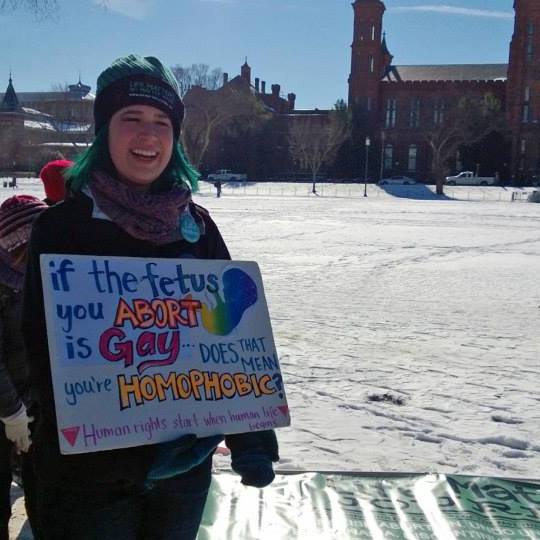
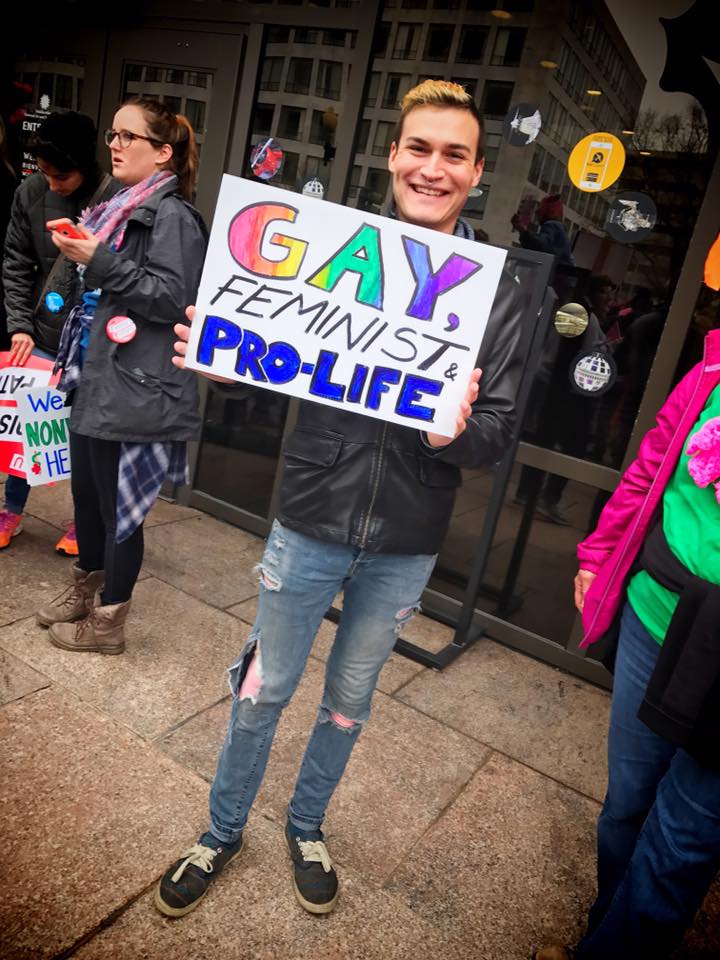
See also:
How does the pro-life movement look to LGBT pro-lifers?
Creating an LGBT-Inclusive Pro-life Community
Atheist, Gay, Pro-life: An Activist Describes His Conversion
Pro-lifers cozy up to the LGBT movement.
The average American wants both gay marriage and extreme abortion restrictions
Pro-life does not mean anti-gay marriage.
Why this bisexual, vegan atheist is at the March for Life
Trans* people and abortion
1c. We’re not all religious.
a. Depending on polls, between one sixth and one fifth of nonreligious Americans are anti-abortion. (See “Are you One of Six Million?”)
b. The non-religious pro-lifer isn’t a “fake” secularist either. Atheist apologist Christopher Hitchens himself argued on behalf of the unborn child.
c. The U.S. is becoming less religious all the time; in particular, the youngest generation identifies less with religion than generations before us. Yet national anti-abortion sentiment remains largely unchanged—for every generation.
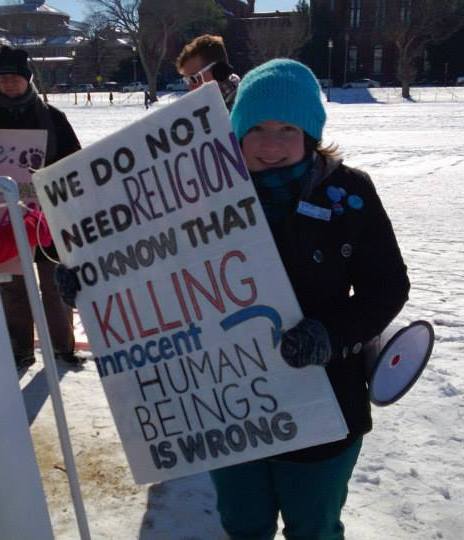
See also:
Christopher Hitchens wound up opposing abortion choice
We are here!
Feminist, Pro-Life, and Atheist
Confessions of a Pro-Life Atheist: Why I Fight Abortion
Yes, there are pro-life atheists out there. Here’s why I’m one of them.
The pro-life movement belongs to all of us.
1d. We’re not all white.
Polls show 51% of African Americans and 61% of Hispanic Americans think abortion is morally wrong. And a range of 30% to 40% of African Americans as well as 50% of Hispanic Americans think abortion should generally be illegal. A multivariate analysis of answers about abortion from the General Social Survey going back four decades found that black men and women have consistently been less accepting of abortion than white men and women.
Many people on both sides of the debate are aware of the disproportionate rates of abortion for African American and Latino communities. It’s important to recognize this disproportion isn’t something people of color readily accept. Many people within these communities are anti-abortion.
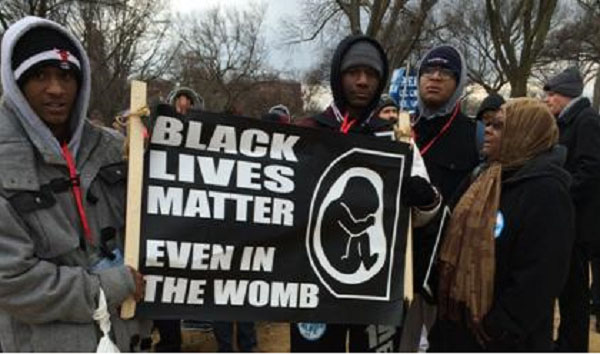
See also:
Inside the black anti-abortion movement
Moral Credibility And Ethnic Diversity In The Pro-Life Movement
Abortion’s Racial Gap
How we responded when NARAL activists came to protest our pregnancy center
‘Black babies matter’: The black anti-abortion movement’s political problems
Pro-Black Pro-Life
Latinos 4 Life
Issues4Life Foundation
1e. We’re not all Republican.
Nearly a third of Democrats and a fourth of people who describe themselves as “liberal” also describe themselves as “pro-life.” Similarly, nearly a third of Democrats say abortion should generally be illegal.
Historically the pro-life movement was actually quite progressive, and the Democratic Party was more accepting of pro-lifers in its ranks. Unfortunately, now being pro-choice seems to be a litmus test of a “true” Democrat. It makes sense to me that the same groups who insist all pro-lifers are Republicans insist any self-identifying pro-life Democrat isn’t a “real” Democrat, regardless of how many leftist positions the person holds. But wishing the stereotype-defying pro-lifers will disappear won’t make it so.
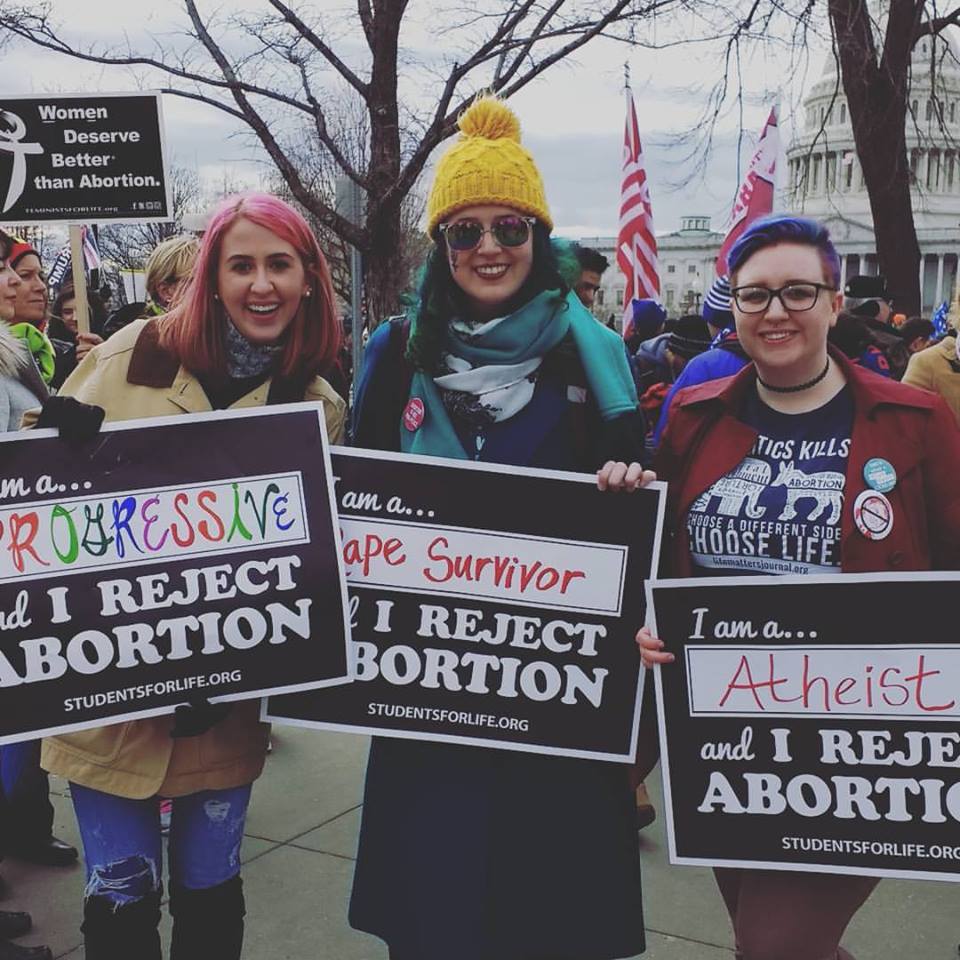
See Also:
The Progressive Roots of the Pro-Life Movement
Democrats for Life of America
Anti-abortion Democrats struggle to find acceptance on either side of the aisle
Why I Am a Pro-Life Libertarian
Being Pro-Life Doesn’t Make Me Any Less of a Lefty
The Extinction of the Pro-Life Democrat in Congress
Are Pro-Life Democrats Welcome in the Democratic Party?
Democrats’ self-inflicted abortion problem
I Am a Pro-Life Progressive. Don’t Shun Me.
Is It Possible to Be an Anti-Abortion Democrat? One Woman Tried to Find Out
Three-in-ten or more Democrats and Republicans don’t agree with their party on abortion
1f. We’re not all men.
Not even close, actually. Of all the demographic stereotypes pushed on the pro-life movement, I think the gender narrative is the most strident and possibly most dishonest.
Even if the ratios aren’t 1:1, there are real correlations between being pro-life and right-wing or being pro-life and religious. And given the strong correlation between being LGBT and being a left-winger, there’s probably a real correlation between being pro-life and straight. And while the data isn’t there to support the “old” and “white” stereotypes, people don’t harp on those factors nearly as often as they repeat the gender myth.
The “anti-choice war on women” narrative is ubiquitous: out-of-touch, controlling, misogynistic men are the driving force of the pro-life movement, and any woman who doesn’t hate herself is pro-choice. By now the idea is conventional wisdom. It’s also total nonsense.
According to Gallup, once you account for the margin of error, women are just as likely as men to think abortion should be illegal all or most of the time. Moreover, there are significantly more women who think abortion should generally be illegal than there are those who think it should generally be legal.
And this trend is reflected in the makeup of the pro-life movement. Despite the endlessly echoed (and uncited) claim that “77% of anti-abortion leaders are men,” much of our movement is led by women.
I think it’s possible for intellectually honest people who just aren’t that involved in the abortion debate to miss the pro-life secularists, LGBT people, and other non-traditional pro-lifers. But a person would have to really not be paying attention to genuinely believe the pro-life woman is an anomaly.
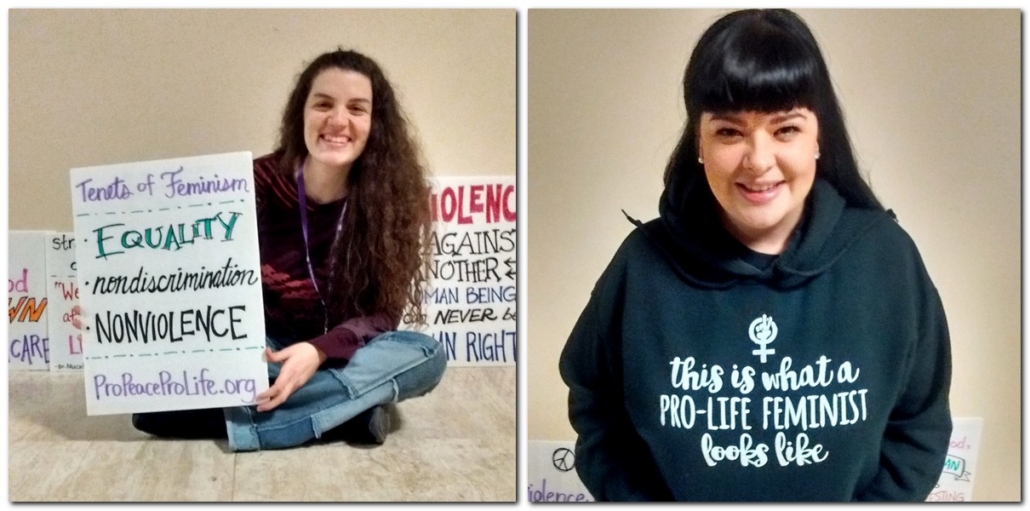
See also:
Hi. We exist. – XOXO Pro-Life Women
The “Anti-Choice War on Women”
Two young women drive antiabortion movement’s revival
The Four Most Powerful Pro-Life Female Voices
2. We’re not anti-woman.
2a. Anti-woman motivations.
The first and more common form is that pro-lifers are against abortion because we don’t respect or like women. That is, our misogyny motivates us to try to control women’s bodies, choices, and lives.
I think this idea comes about largely because many pro-choicers assume the fetus is not a morally relevant human being, and, importantly, they further assume pro-lifers secretly or subconsciously agree with this view. If that’s the case, our anti-abortion efforts can’t truly be motivated by concern for human lives; there must be some other, more sinister reason we’re making such a big deal about abortion. It must be because we’re misogynists, and we talk about human rights only as a cover for our disdain.
But this perspective doesn’t explain why abortion views don’t divide along gender lines or why there are so many female pro-life activists, including pro-life leaders (see point #1f). And it definitely doesn’t explain the existence of feminist pro-lifers—by that I mean people who share traditionally feminist goals outside of abortion on demand. For example there are plenty of pro-lifers who care about fighting rape culture, decreasing gender stereotypes, increasing support for pregnant women (and parents and families in general), and generally fighting prejudice based on gender, sexuality, and race. You can be for all of those goals and also against abortion. I am.
And, most of the time, when I develop friendships of some depth with people who are pro-choice, they recognize my passion for gender issues and my embrace of the feminist label, and they see that my anti-abortion stance is based on reasoning quite separate from any anti-woman sentiment. This is one of the reasons I think it’s so good for us to have friends who think differently than we do: friendship destroys prejudice. We’ve seen this when it comes to race and sexuality, and I think it can also be true for politics. Some of my pro-choice friends have told me they think differently about pro-lifers just for having known me, and I feel the same way about them.
I’m not pretending there’s no such thing as a misogynist pro-lifer. Misogyny is a real problem, and I believe some pro-lifers are misogynists because some people are misogynists (and a lot of people are pro-life). But I don’t think the two views are as correlated as our opposition likes to insist. In fact, I suspect the more you get to know pro-lifers, the more you’ll see how much many of us care (see point #7) and the less you’ll believe we all just hate women.
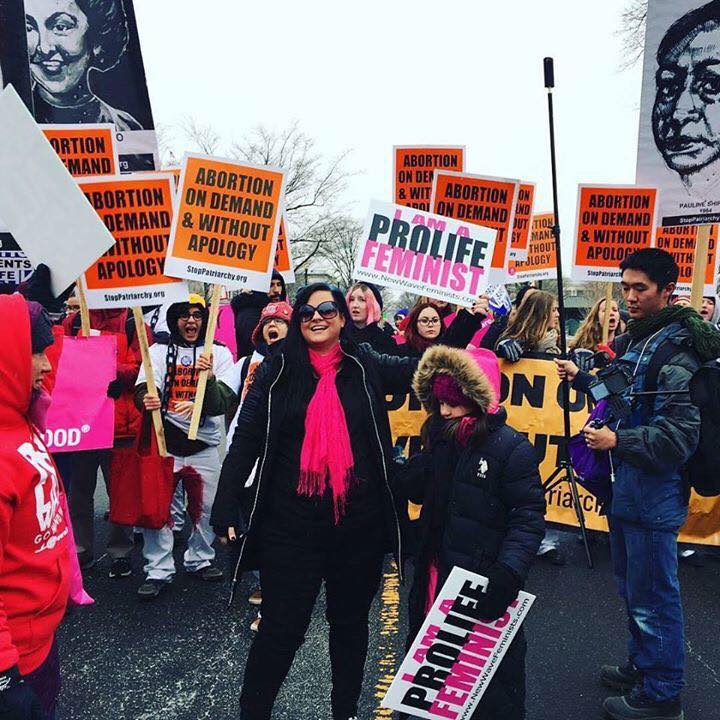
2b. Anti-woman effects.
The second form of the anti-woman accusation is sort of a fall back from the first. When face-to-face with pro-lifers who clearly do care about women, some pro-choicers will say that, while we may not have specifically anti-woman motivations, it doesn’t matter because our goal of restricting abortion will have anti-woman effects.
First, this makes the “anti-woman” accusation pretty misleading. We generally accuse people of being “anti-[whatever group]” based on their motivations, not their effects. Conflating motivation and effect is the tactic used to accuse pro-woman policies of being “anti-man,” religious diversity policies of being “anti-Christian,” or affirmative action policies of being “anti-white.” This tactic ignores the positive, affirmative reasons people might hold a position and insists such people, by definition, are “anti-[whatever group],” regardless of their actual motivations or feelings on the subject. So I think this versionof the “anti-woman” accusation is pretty disingenuous.
Second, it’s not at all clear that abortion restrictions are anti-woman while fully embracing abortion is pro-woman. Many of us believe unrestricted abortion is the excuse society uses to not support pregnant and parenting women and the excuse certain kinds of men use to guiltlessly skip out on unplanned fatherhood. “Choice” doesn’t have such a nice connotation when it comes in the form of “well it was your choice to have the baby, so you deal with it.” Feminists against abortion, including some of our country’s most prominent feminist foremothers, have long called attention to how abortion can exploit women.
Beyond that, abortion is so heavily politicized that some don’t want to admit there’s any negative aspect or moral complexity to it, lest they give credence to the pro-life view. But this means realities like fetal development or the link between abortion and pre-term birth are glossed over, leaving women without information they may have wished they had. It means increasing insistence that there’s nothing to regret or feel shame over, alienating and dismissing the women who do struggle with those feelings. It means downplaying how abortion is used to cover up sex trafficking. It also means horrors like Kermit Gosnell’s clinic—in which both a woman and already-born children were killed—can fester in the vacuum of any real oversight and, when they are discovered, can go largely unnoticed in the vacuum of media coverage.
I’m not saying the average pro-choice person is aware of or accepts all of these problems. I don’t think that’s true. But I am saying that if being “anti-woman” is about effects, not motivation, than our country’s relatively liberal embrace of abortion can be quite anti-woman.
The “War on Women” rhetoric would have you believe abortion is unquestionably at the heart of women’s liberation and therefore anyone against abortion is against women. But in reality abortion’s effects on women are more complicated than that—so much so that, even independent of the question of fetal value, people who care about women can reasons to come down on either side of the abortion debate.
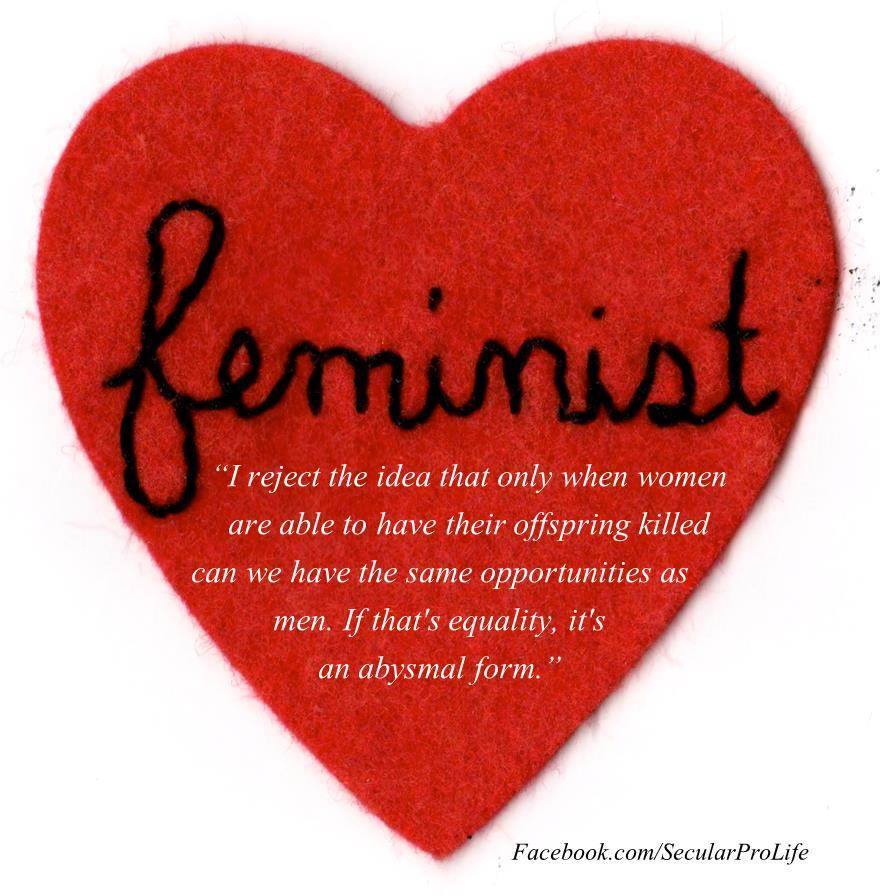
See Also:
When Abortion Suddenly Stopped Making Sense
Our Current Abortion Law as a Product of Men
Divided by Abortion, United by Feminism
I’m a feminist and I’m against abortion
A Feminist Response to Cuomo’s Reproductive Healthcare Act (p6)
Pro-Life Feminism
Can I be a feminist too?
This anti-abortion feminist had a foot in both marches.
New Wave Feminists
The Troubling Ideals at the Heart of Abortion Rights
These Anti-Abortion Women Say They’re the Real Feminists: ‘Feminism Includes Women Who Aren’t Born Yet’
3. We’re pro-contraception.
I can understand why people would get the impression that if I am anti-abortion I must be anti-contraception. There are plenty of pro-life organizations and leaders who are openly anti-contraception, and if you aren’t very involved in a given political movement, it’s easy to assume after a cursory glance that the most prominent activists represent the majority of the movement.
But in this case you’d be mistaken. Polls suggest a minimum of 78% of pro-lifers find contraception morally acceptable. And it’s not just that we think it’s alright in theory; we think so in practice, too. Research suggests the strong majority (over 80%) of sexually active American women use some form of artificial contraception. Note that, if about half of American women are pro-life, this means the majority of self-described sexually active pro-life women use artificial contraception.
(Pro-choice author Will Saletan over at Slate has a great post explaining why the data suggests pro-lifers are not anti-contraception.)
Certainly SPL takes a pro-contraception stance.
See also:
You can be pro-life and pro-contraception. Most of us are!
Practical ways to address the causes of abortion
Pro-lifers & Birth Control
All Our Lives
4. We like sex.
4a. The “anti-sex” accusation stems mostly from our different views of fetal life, not our different views of sex.
There are a lot of different reasons people are pro-choice. I think most pro-choicers empathize with the very difficult position an unplanned pregnancy can put a woman in, and many are concerned about protecting bodily rights.
But it also seems some people advocate for abortion primarily based on sex. That is, they think people ought to be able to have sex lives unhindered by potential procreation. Such an abortion advocate might describe this idea in terms of sexual liberation and gender equality, but for many on our side of the fence, it doesn’t sound so noble. For those of us who view the fetus as a morally relevant human being, advocating fetal destruction in the name of sexual liberation sounds supremely…backwards. It sounds like valuing an active, enjoyable sex life over not killing people.
But of course that’s not how most abortion advocates see it. In my experience, most of the “sexual liberation” pro-choicers don’t see the fetus as a human being, or at least not a morally relevant one. So it’s not about advocating an active sex life over actual human lives. It’s about valuing sexual freedom over nebulous, irrelevant “clumps of cells.” If I thought that’s all abortion involved, I would feel similarly.
In other words, our views differ more based on how we think of fetal life than how we think of sex.
It’s important for pro-lifers to understand this, rather than hurl accusations of selfish, sexual promiscuity at the other side. It’s likewise important for pro-choicers to see this, rather than accuse us of simply hating sex. Saying people should make sexual decisions such that they’re not in a position to want an abortion doesn’t mean we hate sex any more than saying people shouldn’t drink and drive means we hate driving. Drive as much as you like. But do so safely and, above all, please don’t kill anyone.
4b. Different views of sex are still a factor, but not as big of one as people think.
I think most of the anti-sex accusation comes down to different views of fetal life, but not all of it. Religious people are more likely than non-religious people to be pro-life, and plenty of religious people are more likely to speak out against sex outside of marriage. I think there’s a decent argument to be made that “anti-premarital-sex,” or the broader “anti-reckless-sex,” are not equivalent to “anti-sex.” Plenty of people who think it’s better to wait until marriage have active, enjoyable sex lives with their spouses and like sex quite a lot. But I think the more compelling point is that most pro-lifers don’t actually wait until marriage to have sex.
How do I know this? First and foremost, because the vast majority of people in general have premarital sex, and pro-lifers are about half of the country. So there’s that math. Besides that, the pro-life movement doesn’t fit the 1:1 correlation to conservative Christians that so many people expect (see point #1). We like sex, we have sex outside of marriage, we have sex using contraception (point #2), and we still think it’s wrong to kill fetuses.
See also:
Abortion, Sex Positivity, and the Non-Aggression Principle
Is the pro-life movement anti-sex?
5. We experience unplanned pregnancies too…
…but no, that doesn’t automatically mean we turn pro-choice.
Some pro-choicers seem to think we are only anti-abortion because we just don’t understand how frightening and life-changing an unplanned pregnancy can be, and that if we were to be put in that difficult position, we’d choose abortion too.
And, interestingly, is isn’t just pro-choicers who make this assumption. Some anti-contraception pro-lifers seem to think that anyone who has sex while using contraception (which, as shown in point #3, would include most pro-lifers) isn’t “open to life” and thus will choose abortion if they accidentally procreate.
But it’s not the case. According to the CDC, about 37% of births result from unplanned conceptions. In 2012 there were about 3.9 million births, meaning over 1.4 million women carried unplanned pregnancies to term.
That’s not to say every self-described pro-life woman always chooses life. It’s true, of course, that some pro-life women do rescind their views and get an abortion. But it’s also true that plenty of women stand by their convictions, carrying out crisis pregnancies even when (from a pro-choice perspective) abortion may have been much simpler. Insisting we’re all one unplanned pregnancy away from being pro-choice not only implies none of us are sincere in our beliefs, but also demeans or outright ignores the courage, sacrifice, and love with which so many mothers have carried and birthed their unplanned children. In that sense, frankly, I think it’s a pretty anti-woman thing to say.
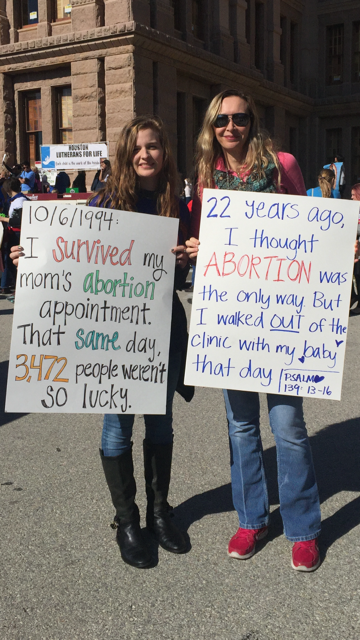
And meanwhile pointing out inconsistency isn’t as meaningful as so many people suggest, mostly because it goes both ways. Just as some women switch to the pro-choice side in the face of an intimidating pregnancy, some women switch to the pro-life side when they experience a planned pregnancy and come to a new understanding of fetal development. And some women switch to the pro-life side because of their experiences with abortion. Which brings me to my next point…
6. Many of us are post-abortive…
…and converted to the pro-life side for that very reason.
This is really an extension of the previous point. Pro-choicers seem to think the pro-life movement is made up of people with no experience: no relationship problems, health issues, financial hardships, postponed education, complicated careers, and, above all, crisis pregnancies. They seem to think someone would only be against abortion if they were out of touch with life’s hardships and naively idealistic about how people should handle crises.
But (again), pro-life people are roughly half of the country. We span political views, ethnic groups, and income brackets (in fact, we’re more likely than pro-choicers to be low-income). We’re not as different from you as you might think. And that includes the fact that some of us know exactly what it’s like to have to choose. And while many of us have chosen life (point #5), not all of us have.
Now, just as pro-choicers shouldn’t believe every pro-life woman would choose abortion if put in the position, pro-lifers shouldn’t believe every woman who gets an abortion will end up regretting it. It’s more of a mixed bag than that. Some women don’t regret–not in the moment, not years later.
But some do. Some feel abortion traumatized them, and they can no longer accept abortion as a legal right. People assume we’re pro-life because of a lack of experience, when in many cases it’s exactly our experiences that brought us here.
7. We care about what happens to the child after birth.
7a. But first, this accusation is nonsensical.
We’re against abortion because we think it should generally be illegal to kill people. By “people” we mean morally relevant human beings, which of course is how we see the fetus. We get you don’t agree, and that’s really the crux of the debate.
But understand that, from our perspective, saying we can’t be anti-abortion until we’ve solved problems like child poverty or a messed up foster care system is as ridiculous to our ears as if you said we can’t speak out against child abuse unless we are going to adopt all abused children. Does anyone actually believe that? Would you argue people can’t condemn child marriage unless they will personally pay off the child’s family debts? People can’t say slaves should be freed unless they’re prepared to personally house and employ all the newly emancipated? Suggesting people can’t call out human rights violations unless they personally have the resources to absorb allimpact is just a terrible precedent.
7b. Pro-life organizations do help born people.
Bad precedent aside, we do care about what happens after the child is born.
There are a lot of pro-life projects revolving around helping mothers and their children. Students for Life of America encourages it’s 900+ campus groups to organize diaper drives and to pursue Pregnant on Campus initiatives, which connect pregnant and parenting students with resources for healthcare, housing, clothing and food assistance, child care, insurance, financial aid, and more. Feminists For Life has fought child exclusion provisions in welfare reform, worked to get poor working pregnant women prenatal care through SCHIP, and advocated for the Enhanced Child Support Enforcement Act. And there are 1,000s of pregnancy resource centers across the country that provide maternity and baby clothes, diapers, wipes, baby wash, strollers, bouncy seats, infant toys, referrals (for housing, employment resources, and educational, financial, and social assistance), parenting classes, even laptops, phones, and cars.
Pregnancy resource centers also work to connect women with adoption services if that is what they need. And plenty of pro-lifers have themselves adopted children in dire situations. Here’s a list of countless ways individual pro-life people have helped low-income single mothers.
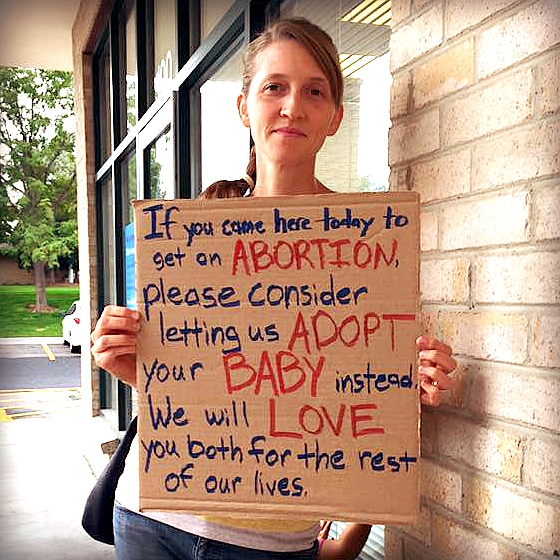
7c. Pro-life individuals help too, independent of their pro-life work.
When people ask “If you’re really pro-life, why don’t you care about [X quality of life] issue?” they seem to assume that everyone who does care about and work on the issue they’ve picked is pro-choice. But I’m not sure why they make that assumption. Between September 2013 and September 2014, over 62 million people did volunteer work of some type (rock on, guys). As far as I know, no one polled the volunteers about their views on abortion, but with the country split on the issue it seems like quite a leap to assume few or none of them are pro-life. Sometimes it seems like unless we assemble en masse with picket signs that say “I’m anti-abortion but today I’m protesting this other issue,” people will insist we don’t care about anything else.
And yet, for example, my very anti-abortion grandmother volunteers every week packaging food and other supplies for local low-income families. For a long while my pro-life brother and I spent our volunteer time tutoring at the Boys and Girls Club. Before that I did volunteer tutoring at a nearby state prison, and since then my brother has offered free tutoring at his university. My anti-abortion dad offers parolees jobs and training, and has attended some of their hearings as a character witness. During the first year of her son’s life, my pro-life sister pumped and froze her extra breast milk so she could donate it to a little girl with spinal muscular atrophy. (Incidentally, for young mothers with no funds for charity, donating breast milk is an excellent way to help other moms and their babies. Learn more here.)
My pro-life mother spent years taking care of an elderly woman she met who had no children and no local family. My mom put a lot of her time into keeping the woman company, taking her on outings, driving her to and from doctor’s appointments, and making sure she was taking her medications all the way until the end. Then Mom took care of the woman’s funeral arrangements and issues with her estate. When pro-choicers claim pro-lifers only care about people until they’re born, I think of my family, and then think how ridiculously false this accusation is.
And my family isn’t an anomaly in the pro-life movement. I know pro-life activists who work for gay rights, children’s rights, and animal rights. I have pro-life friends who conduct cultural proficiency trainings to try to help diverse organizations understand the cultural and racial differences among the people they work with. One of my pro-life friends has based his career helping families, foster providers, and agencies that work with children with behavior challenges or mental health issues. I have two other pro-life friends who do long-distance running to raise money for causes like fighting human trafficking.
I know these are all anecdotes. If there were statistics on the type and extent of charity and volunteer work pro-life people do, I’d happily give them to you. But absent that rather specific research, I point to the Catholic Church—widely known for its anti-abortion stance—and the massive amounts of charity work it does. Catholic Charities USA serves over 10 million people per year, providing food, shelter, education, financial planning, adoption assistance, services to refugees and immigrants, and more. In 2015 alone they spent over $3.8 billion on these projects. Pause and imagine the number of Catholics who donate their money and time to make that happen.
That’s not to say that every Catholic contributing to these causes is pro-life. There are plenty of pro-choice Catholics, and I don’t believe pro-lifers have a monopoly on helping the underserved. But it is to say that it’s highly likely a lot of the people involved in these various humanitarian efforts are also anti-abortion, especially given the correlation between religiosity and a pro-life perspective. You can see similar stats finding that Christians are twice as likely to adopt and 50% more likely to be foster parents as Americans on average.
See also:
So I met some sidewalk counselors
In-Depth Interview: Kristi Burkhart, Executive Director, Pregnancy Care Center
Her Story: Helping Her Become a Mom
What have you personally done to help low-income single mothers?
With a topic as highly polarized as abortion, it’s easy to view our opponents as fools at best, evil at worst, certainly deficient in various ways. And while there really will be fools and even genuinely bad people out there (on both sides), I do believe the reality is that most pro-lifers and pro-choicers aren’t quite as different as the political narratives suggest. I mean, yes, we start with some fundamentally different premises and those are worth debating. But most of the caricatures are just that. And I’ve found within friendships even the more passionate people from each side are able to see that.
[Originally published 2/24/16.]
If you appreciate our work and would like to help, one of the most effective ways to do so is to become a monthly donor. You can also give a one time donation here or volunteer with us here.

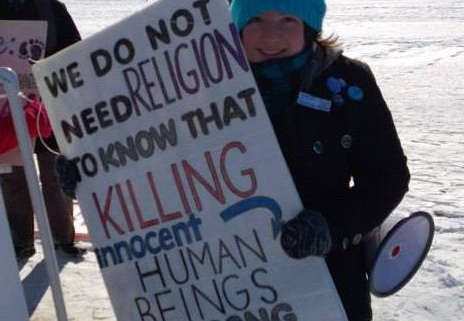
Leave a Reply
Want to join the discussion?Feel free to contribute!